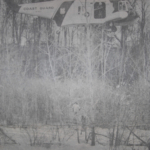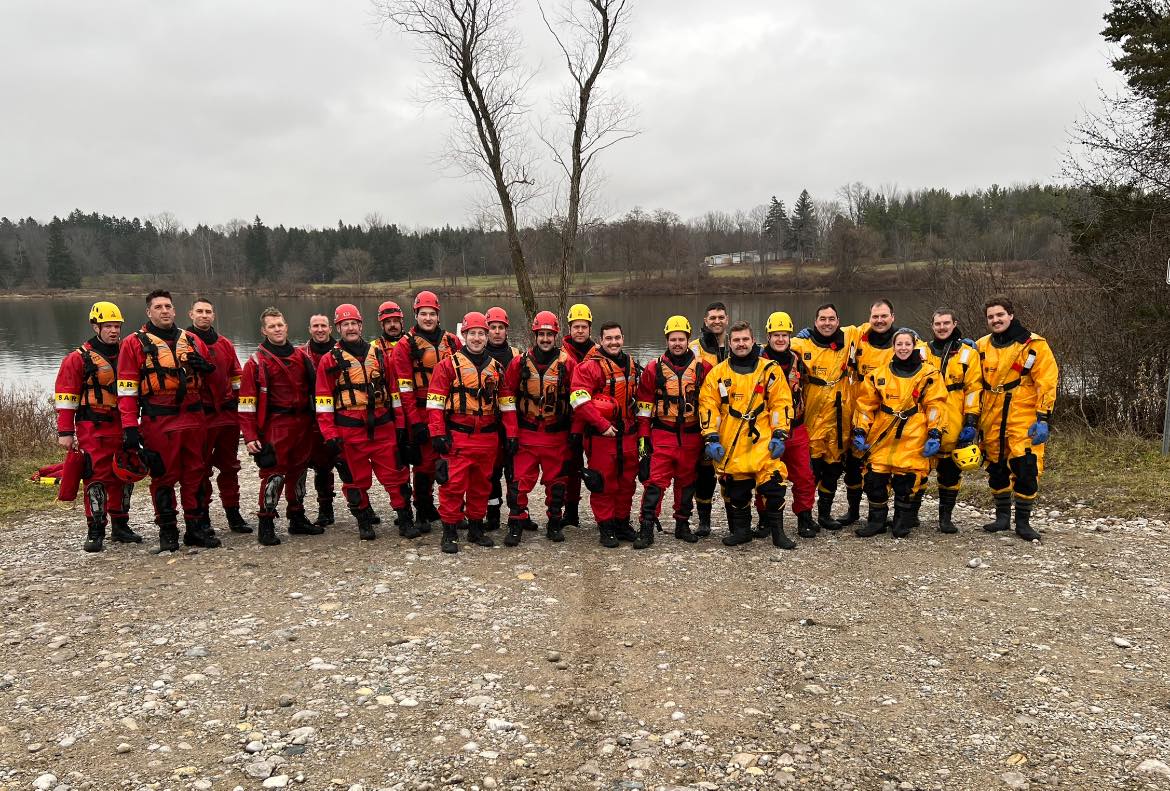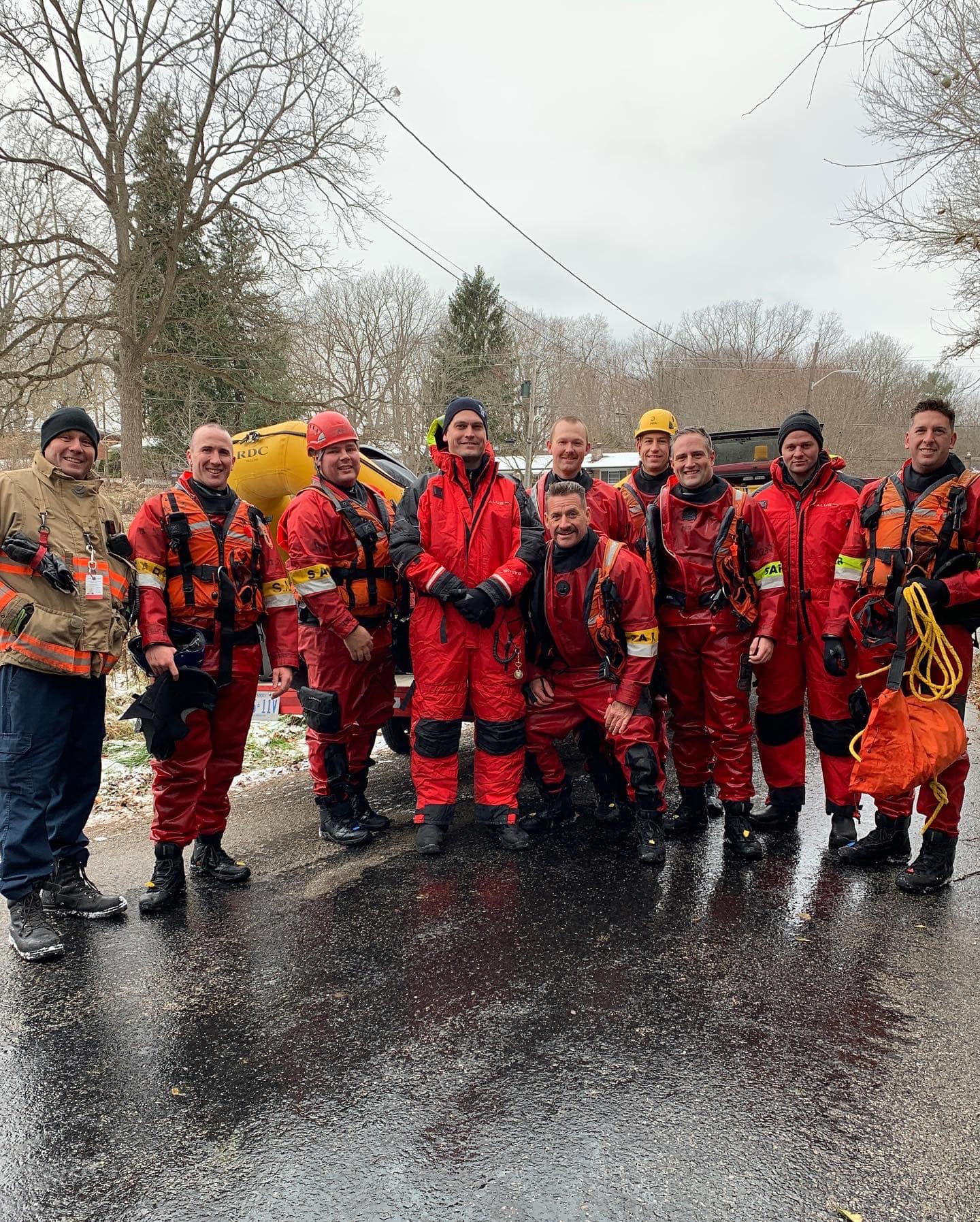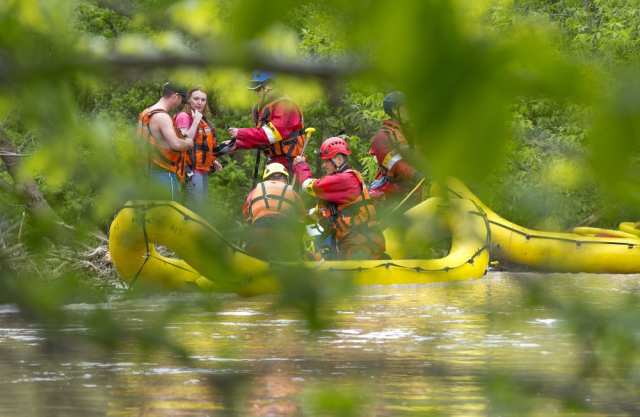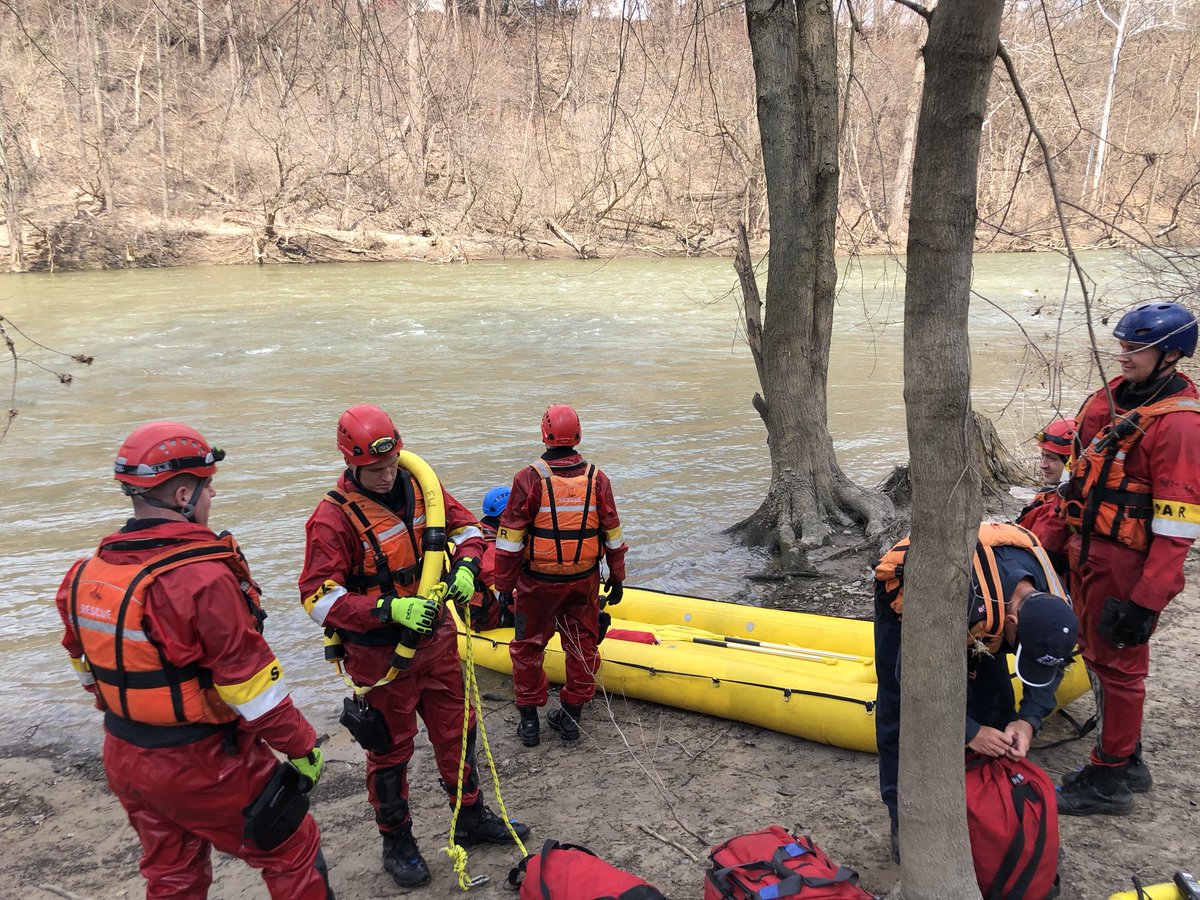- Rescuers help 16-year-old Ken Riegert of Komoka out of a U.S. Coast Guard helicopter after he was rescued from the Thames Saturday. By Bill Smith of The Free Press
- U.S. Coast Guard helicopters were used in two separate incidents over the weekend to save a total of 12 persons in the London area. In the Sunday rescue, one man climbs into the basket lowered by the helicopter while another clings to a tree in the middle of the Thames River below Fanshawe Dam. Eight firefighters also had to be rescued by the chopper. By Sam McLeod of The Free Press
KILWORTH – A United States Coast Guard helicopter rescue Saturday ended a night of frustration on the banks of the Thames River as a father and son clung to trees on a flooded island near here for 12 ½ hours.
Walter Riegert, 40, of 120 Simcoe Cres., Komoka, and his son Ken, 16, spent the night on a small tree limb above the water.
The U.S. Coast Guard did in 20 minutes what Canadian authorities failed to accomplish in 4 ½ hours of rescue attempts with ropes, rafts, divers and motor launches.
The pair set out about 5 p.m. Friday on a four-mile canoeing trip from Kilworth bridge to Delaware bridge.
The canoe overturned about 30 minutes later as they passed a flooded island three-quarters of a mile west of the Kilworth bridge. Riegert said later the flood conditions forced the canoe into the partially submerged trees on the island where it upset.
Both Riegerts gripped a tree, sharing a branch as about five feet of water lapped around their feet. The bank of the river was 90 feet away.
Wilma Riegert started a private search shortly after 6 p.m. when her husband and son didn’t arrive at the Delaware bridge as planned.
London OPP were called into the search at 8:15 p.m., but scores of volunteers and eight officers still hadn’t found the pair by 1 a.m.
That’s when the OPP decided to postpone further searching for five hours.
Volunteers continued to look and 20 minutes later the OPP was notified that two civilians had found the canoeists.
“It was strange because we had searched the area earlier and found nothing but this time we heard them yelling for help,” said Darrel Woods of 158 Adelaide St., Mt. Brydges.
With fire rescue unit personnel and OPP officers gathering on the north bank opposite the flooded island, friends of the Riegerts and volunteers expressed growing frustration and anger as makeshift and hastily-arranged plans failed to come close to freeing the pair.
First, a tethered diver with a wet suit was unable to beat the swift waters to reach the pair. Then, two rescue launches from the fire department met the same fate.
Wayne Lockyer of RR 4, Mt. Brydges had a reaction typical of many of the worried civilians’ feelings:
“It’s almost 3:30 (a.m.). Surely they should have been able to get to them by now. The organization is pathetic. Surely we should be better prepared for this sort of thing. Surely.”
Neil Jaggar of 108 Simcoe Cres., Komoka, said he found it difficult to believe his neighbors could be trapped in the middle of the river for so long.
“Things should be better run than this,” he said.
Further plans to attempt rescues with ropes and rafts were dismissed.
OPP officers were trying to get a helicopter to attempt a rescue yet many people expressed surprise that neither of two Canadian services was used.
Some OPP officers said they couldn’t understand why helicopters from the air rescue unit at Trenton or OPP helicopters from Toronto weren’t brought in quickly.
A coast guard helicopter from a Detroit airfield was finally dispatched and slipped into the area 20 minutes ahead of schedule about 6 a.m.
Hovering over the flooded island, helicopter crew members lowered a basket unit to lift Ken, then his father, from their dangerous perch.
The large single-engine Sikorski landed and the pair were bundled into waiting ambulances and taken to Victoria Hospital. The helicopter took off and headed back to Detroit barely 20 minutes after it first clipped low over the trees to the accident scene.
Canadian helicopters were not used, officials said, because it would have taken longer to collect a crew and fly to the scene. It is about 110 miles from London to Toronto and about 240 miles to Trenton.
Early reports said OPP helicopters couldn’t be used because they weren’t equipped with night flying gear. This was disputed by OPP deputy commissioner Ken Grice.
“The availability of a helicopter and the time required to get a pilot through Toronto and fly to the scene meant it would have taken just as long.”
“The large (coast guard) helicopter was available with a basket for a safe lift. It was just the availability of a heavier machine.”
“In a situation like this, people tend to point a finger and say you should have done this or done that. To have one of those machines, you are talking about $1 million for the odd occasion.”
At Trenton’s military air base, air rescue unit members said they got a call for help at 4 a.m.
Capt. Bob Zimmer, dept controller, said a decision was made to contact the U.S. Coast Guard in Cleveland. Canada and the U.S. have a reciprocal aid agreement, he said.
He cited the reason for calling Cleveland as a two-hour standby time to get a helicopter and crew into the air and another two hours in flight. He said weather conditions between London and Trenton also had a bearing on the decision.
Tom Erickson, assistant controller for the Coast Guard Rescue Co-ordination Centre in Cleveland, said a request for assistance was filed by Trenton at 4:15 a.m.
In turn, Cleveland notified the coast guard heliport in Detroit and a helicopter with two pilots and one crew member was in the air by 4:30. It had returned to home base by 7:30 a.m.
Mrs. Riegert, who describes herself as a devout Christian, refused to give up hope even during the
7 ½ – hour period before her husband and son were located.
“I prayed to my God and I was sure,” she said. “Of course, you have doubts but I was sure they would be found, and safe.”
by John Hamilton and Dave Dauphinee of The Free Press
- Rescuers help 16-year-old Ken Riegert of Komoka out of a U.S. Coast Guard helicopter after he was rescued from the Thames Saturday. By Bill Smith of The Free Press
- U.S. Coast Guard helicopters were used in two separate incidents over the weekend to save a total of 12 persons in the London area. In the Sunday rescue, one man climbs into the basket lowered by the helicopter while another clings to a tree in the middle of the Thames River below Fanshawe Dam. Eight firefighters also had to be rescued by the chopper. By Sam McLeod of The Free Press
KILWORTH – A United States Coast Guard helicopter rescue Saturday ended a night of frustration on the banks of the Thames River as a father and son clung to trees on a flooded island near here for 12 ½ hours.
Walter Riegert, 40, of 120 Simcoe Cres., Komoka, and his son Ken, 16, spent the night on a small tree limb above the water.
The U.S. Coast Guard did in 20 minutes what Canadian authorities failed to accomplish in 4 ½ hours of rescue attempts with ropes, rafts, divers and motor launches.
The pair set out about 5 p.m. Friday on a four-mile canoeing trip from Kilworth bridge to Delaware bridge.
The canoe overturned about 30 minutes later as they passed a flooded island three-quarters of a mile west of the Kilworth bridge. Riegert said later the flood conditions forced the canoe into the partially submerged trees on the island where it upset.
Both Riegerts gripped a tree, sharing a branch as about five feet of water lapped around their feet. The bank of the river was 90 feet away.
Wilma Riegert started a private search shortly after 6 p.m. when her husband and son didn’t arrive at the Delaware bridge as planned.
London OPP were called into the search at 8:15 p.m., but scores of volunteers and eight officers still hadn’t found the pair by 1 a.m.
That’s when the OPP decided to postpone further searching for five hours.
Volunteers continued to look and 20 minutes later the OPP was notified that two civilians had found the canoeists.
“It was strange because we had searched the area earlier and found nothing but this time we heard them yelling for help,” said Darrel Woods of 158 Adelaide St., Mt. Brydges.
With fire rescue unit personnel and OPP officers gathering on the north bank opposite the flooded island, friends of the Riegerts and volunteers expressed growing frustration and anger as makeshift and hastily-arranged plans failed to come close to freeing the pair.
First, a tethered diver with a wet suit was unable to beat the swift waters to reach the pair. Then, two rescue launches from the fire department met the same fate.
Wayne Lockyer of RR 4, Mt. Brydges had a reaction typical of many of the worried civilians’ feelings:
“It’s almost 3:30 (a.m.). Surely they should have been able to get to them by now. The organization is pathetic. Surely we should be better prepared for this sort of thing. Surely.”
Neil Jaggar of 108 Simcoe Cres., Komoka, said he found it difficult to believe his neighbors could be trapped in the middle of the river for so long.
“Things should be better run than this,” he said.
Further plans to attempt rescues with ropes and rafts were dismissed.
OPP officers were trying to get a helicopter to attempt a rescue yet many people expressed surprise that neither of two Canadian services was used.
Some OPP officers said they couldn’t understand why helicopters from the air rescue unit at Trenton or OPP helicopters from Toronto weren’t brought in quickly.
A coast guard helicopter from a Detroit airfield was finally dispatched and slipped into the area 20 minutes ahead of schedule about 6 a.m.
Hovering over the flooded island, helicopter crew members lowered a basket unit to lift Ken, then his father, from their dangerous perch.
The large single-engine Sikorski landed and the pair were bundled into waiting ambulances and taken to Victoria Hospital. The helicopter took off and headed back to Detroit barely 20 minutes after it first clipped low over the trees to the accident scene.
Canadian helicopters were not used, officials said, because it would have taken longer to collect a crew and fly to the scene. It is about 110 miles from London to Toronto and about 240 miles to Trenton.
Early reports said OPP helicopters couldn’t be used because they weren’t equipped with night flying gear. This was disputed by OPP deputy commissioner Ken Grice.
“The availability of a helicopter and the time required to get a pilot through Toronto and fly to the scene meant it would have taken just as long.”
“The large (coast guard) helicopter was available with a basket for a safe lift. It was just the availability of a heavier machine.”
“In a situation like this, people tend to point a finger and say you should have done this or done that. To have one of those machines, you are talking about $1 million for the odd occasion.”
At Trenton’s military air base, air rescue unit members said they got a call for help at 4 a.m.
Capt. Bob Zimmer, dept controller, said a decision was made to contact the U.S. Coast Guard in Cleveland. Canada and the U.S. have a reciprocal aid agreement, he said.
He cited the reason for calling Cleveland as a two-hour standby time to get a helicopter and crew into the air and another two hours in flight. He said weather conditions between London and Trenton also had a bearing on the decision.
Tom Erickson, assistant controller for the Coast Guard Rescue Co-ordination Centre in Cleveland, said a request for assistance was filed by Trenton at 4:15 a.m.
In turn, Cleveland notified the coast guard heliport in Detroit and a helicopter with two pilots and one crew member was in the air by 4:30. It had returned to home base by 7:30 a.m.
Mrs. Riegert, who describes herself as a devout Christian, refused to give up hope even during the
7 ½ – hour period before her husband and son were located.
“I prayed to my God and I was sure,” she said. “Of course, you have doubts but I was sure they would be found, and safe.”
by John Hamilton and Dave Dauphinee of The Free Press


